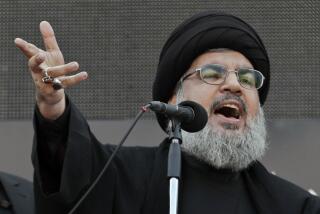Saddam Hussein: ‘Realistic,’ ‘Utterly Ruthless’ : Leadership: Iraqi is described as a practitioner of ‘blood and iron’ policy.
- Share via
WASHINGTON — Saddam Hussein’s dream is to be another Gamal Abdel Nasser, though the architect of the newest crisis in the Middle East has little of the personal magnetism that made the Egyptian strongman of the 1950s and 1960s the kingpin of the splintered Arab world.
Hussein is 53, a little jowly, more than amply filling his Western business suits and his military uniforms. He is devoid of the personal charisma that helped his hero build a fanatical following of millions. He has none of the theatrical flare of Libya’s Moammar Kadafi. Westerners who see him face to face--as did four U.S. senators earlier this year--usually go away knowing no more about him than they did before.
Indeed, his efforts to develop nuclear weapons, his use of poison gas against the Kurdish minority and Iran and his bombastic threats have at times encouraged an image of irrationality.
But experts characterize Hussein as a skilled tactician and astute politician. “He is realistic, reasonable and utterly ruthless,” said James R. Schlesinger, a former secretary of defense and former director of central intelligence.
“Chancellor Bismarck said ‘the future of history will not be decided by the votes of parliaments, but by blood and iron,’ and Hussein is a practitioner of that,” Schlesinger said. “The only thing surprising about what he did (in Kuwait) is that people are surprised.”
Hussein has made himself a power beyond Iraq and forced his dream of Arab leadership to be taken seriously for two reasons: His barren country sits on the world’s richest oil deposits outside of Saudi Arabia, and he commands a million-member army equipped with high-tech Western armaments--including deadly chemical weapons and the missiles to deliver them.
His military forces--victorious in an eight-year war with Iran--and his ruthless willingness to use them have significantly changed the power balance in the Middle East. Other Arab leaders were nervous even before Hussein picked his fight with Kuwait over oil prices, and Hussein’s power has lent credence to his casting himself as Nasser’s successor.
Throughout the Arab world--among admirers and opponents alike--he is known simply as Saddam.
Still, he is a man of monumental ego--fired by a hatred of Israel and the West--who dominates his nation’s television airwaves and papers his capital with his picture in a variety of garbs to suit all tastes.
He is surrounded by layer upon layer of security police, many of them with common roots back in his home village of Tikrit. They have helped create an apparatus that insured against the development of any meaningful political opposition.
Hussein left his home village as a boy, and is said to have committed his first murder when he was 14 and attempted his first political assassination when he was 22. He was trained as a lawyer at the University of Cairo and the University of Baghdad, while also becoming a student of revolutionary politics. He became and continues to be a voracious reader of biographies of the world’s great leaders.
Now ensconced as “president for life” at the head of a relatively modern secular state, Hussein so far has succeeded through brutal oppression of his opposition.
He has wasted little energy cultivating allies, instead feuding with Syria, carrying on the brutal war with Iran and turning against erstwhile friends such as Kuwait, who supported him in that war.
By one account, he has circulated around the Middle East a videotape of a 1979 trial for 21 members of his Baath Party, whom he suspected of collusion with Syria. He is shown sitting before a crowd of 1,000 party members and officials, demanding that the rumored traitors stand and identify themselves.
As he casually smokes a cigar and waits, the 21 surrender to security men one by one--and were said to have been subsequently executed.
Over the years since an Israeli air strike wiped out an Iraqi nuclear reactor under construction, Hussein has adamantly denied that he is trying to acquire a nuclear capability to go with his chemical weapons.
But evidently fearing that Israel might make another preemptive strike against his imposing military machine, he threatened earlier this year to destroy half of Israel in response to any such attack.
“I swear to God that if Israel dares to hit even one piece of steel on any industrial site, we will make the fire eat half of Israel,” he declared in a radio broadcast.
The rhetoric, more than calculated actions, has spawned the image of a wild man in doubtful control.
But the truth, say Western diplomats in Baghdad, is that Hussein is a wily master of Arab politics, who swings from empty exaggerated rhetoric to understated threats that often carry far more significance.
Had the West listened closely enough, Schlesinger said Thursday, it could have heard warnings two weeks ago of what was to happen in Kuwait.
Abramson reported from Washington and Williams from Yemen.
More to Read
Sign up for Essential California
The most important California stories and recommendations in your inbox every morning.
You may occasionally receive promotional content from the Los Angeles Times.










